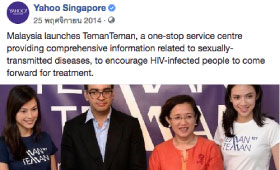|
|
AIDS 2016 - Characteristics of HIV risks among Thai young men who have sex with men and transgender youth using an eCounseling platform
Please download the e-Poster here
http://programme.aids2016.org/PAGMaterial/eposters/0_4844.pdf TITLE Characteristics of HIV risks among Thai young men who have sex with men and transgender youth using an eCounseling platform PRESENTER Tarandeep Anand AUTHORS T. Anand1,2, C. Nitpolprasert1,2, J. Ananworanich2,3,4, J. Jantarapakde1, S.J. Kerr5, A.H. Sohn6, K.E. Muessig7, L.B. Hightow-Weidman8, P. Phanuphak1,5, N. Phanuphak1,2 INSTITUTIONS 1The Thai Red Cross AIDS Research Centre, Bangkok, Thailand, 2SEARCH, The Thai Red Cross AIDS Research Center, Bangkok, Thailand, 3U.S. Military HIV Research Program, Walter Reed Army Institute of Research, Silver Spring, United States, 4Henry M. Jackson Foundation for the Advancement of Military Medicine, Bethesda, United States, 5HIV-NAT, The Thai Red Cross AIDS Research Centre, Bangkok, Thailand, 6TREAT Asia/amfAR, The Foundation for AIDS Research, Bangkok, Thailand, 7Gillings School of Global Public Health, University of North Carolina at Chapel Hill, Department of Health Behavior, Chapel Hill, United States, 8Behavior and Technology Lab, Institute for Global Health and Infectious Diseases, University of North Carolina at Chapel Hill, Chapel Hill, United States Background: Many young men who have sex with men (YMSM) and TG youth in Thailand are closeted, experience societal stigma and are not provided education on safe sex practices from their families or in schools, relying instead on the Internet or friends for basic information. We evaluated risk behaviors and characteristics of Thai YMSM and TG youth seeking sexual health advice and online HIV counseling. Methods: Adam''s Love (www.adamslove.org), an innovative HIV prevention intervention launched by The Thai Red Cross AIDS Research Centre (TRCARC) has established a sustainable e-counseling platform for Thai MSM and TG, to provide linkage to HIV testing and treatment services. Those counseled are encouraged to complete risk behavior surveys. Results: Between Sep 2011 - Dec 2015, 17,357 MSM and TG received online counseling. Of 547 MSM and TG who received online counseling and completed a behavioral risk survey in the last quarter of 2015, 72% were age ≤25 years and almost half sought sex using social media (41.5%). Participants aged 14-18 years were less likely to use condoms with casual partners (50%) vs. those aged 19-25 years (33%) and aged ≥26 years (29%); P=0.004). Most had never been tested for HIV (79% vs. 51% for MSM aged 19-26 and 35% for those aged ≥26 years; P< 0.001). Seven percent of all participants reported illicit drug use in the previous 6 months, and rates were similar across age groups. In a multivariate logistic regression model, finding sex partners through social media (aOR 2.0, 95%CI 1.4-2.8; P< 0.001), using illicit drugs (aOR 2.1, 95%CI 1.1-4.1; P=0.03) and younger age was associated with inconsistent condom use with casual partners. Compared to participants aged ≥26 years, those aged 14-18 years had significantly higher odds of inconsistent condom use (aOR 2.8, 95%CI 1.6-4.9; P=0.001); in those aged 19-25 years the odds was comparable (aOR 1.3, 95%CI 0.8-1.9; P=0.3). Conclusions: In this study, the youngest group of MSM and TG assessed engaged in the highest risk behaviors and had lower rates of testing. This highlights the need for continued investment in online interventions, such as e-counseling to provide linkage to HIV testing and treatment services. http://programme.aids2016.org/Abstract/Abstract/4844 |

















